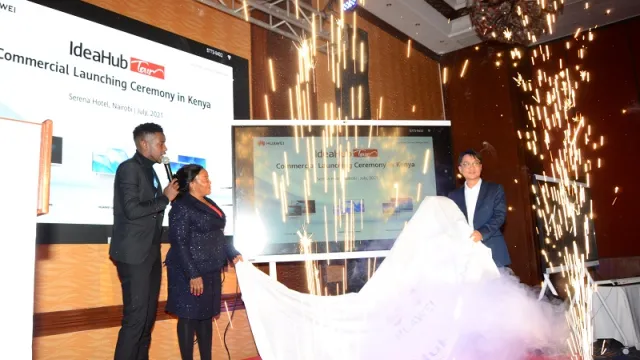HUAWEI woos smart office, education users in Kenya with suit of digital tools

HUAWEI woos smart office, education users in Kenya with suit of digital tools
Global tech giant HUAWEI has unveiled the IdeaHub series of products in Kenya targeting smart office users as well as the education sectors.
IdeaHub is a digital productivity tool which puts together intelligent writing, High Definition (HD) video conferencing functions as well as wireless sharing.
An IF Design Award 2021 winner, IdeaHub is modelled to suit a range of work environments, turning conventional conference rooms, executive offices and the open work areas into smart spaces.
The ‘HUAWEI IdeaHub Board’, emphasizes on its high efficiency and low-latency with 4K resolution display, supporting devices running on either Windows or Android operating systems.
Designed for convenience in usage and installation, the HUAWEI IdeaHub Board targets medium-scale offices, SMEs, schools and hospitals in Kenya, to enhance the capabilities of business and education sectors, in line with HUAWEI’s mission to roll out digital transformation in the country through innovations.
Huawei Kenya’s CEO Will Meng highlighted how the Pandemic and the Ideahub have impacted the global company:
“We employ over 200,000 employees in more than 1,000 offices across 170 countries and regions, but like most companies, the pandemic also affected us. On our first day of transition, more than half of our employees worked from home. On that day, approximately 40,000 meetings were held to ensure the continuity of work. Slowly we discovered that this shift from our traditional working mode to embracing the digital shift helped free our employees from time and energy wasted in meeting rooms, as well as business trips to different countries, research centers, and representative offices. While the traffic of virtual office services increased six fold, our expenses reduced by 28 per cent.”
Read also: MPs limit Kenyan tycoons’ access to lower offshore tax
Will Meng added that the world of work and collaboration is changing: “In order to maintain productivity, users are demanding new collaboration tools while working remotely."
The HUAWEI IdeaHub series is designed to help people work and learn anytime, anywhere, without time and space constraints, productively and efficiently, he noted, adding: "It intelligently helps you to transform, upgrade and digitize the office or classroom”.
Screen projection and whiteboard writing are two of the most commonly used functions in both smart classrooms and offices.
The HUAWEI IdeaHub Board dropdown bar projection function, which is based on the Cast+ technology, allows users to project content from a smartphone to a large screen without the need for additional apps.
It also provides other projection methods for different scenarios and needs. These include a wireless projection code, IdeaShare Key, and DLNA.
Users need not worry about safety as the privacy protection function ensures personal information won't be shared during the projection.
As for whiteboard writing, HUAWEI IdeaHub Board uses zero-gap bonding technology, and innovative software capabilities to deliver a smooth writing experience with an ultra-low writing latency of 35ms, making the writing as easy as using pen and paper.
Meanwhile, the intelligent text and graphic recognition and email sharing functions deliver a more efficient experience than traditional whiteboards.
Video conferencing is now the norm during the pandemic, and IdeaHub can install any video conferencing app, coming with a high-quality camera with zoom and multiple microphones that automatically zooms in and tracks the speaker.
Principal Secretary, State Department of Vocational and Technical Training (VTT), Ministry of Education, Dr Margaret Mwakima highlighted on the impact IdeaHub will have on Education in Kenya.
“Technology and the Ideahub are already sweeping through classrooms as educators and developers are creating more products designed to enhance education. For us within the TVET sector we welcome this technology because we have already launched the open and distance e-learning policy, we have taken our trainers through online, open distance and virtual learning training but our major challenge has been what kind of technology we can use to reach out to our learners at places and distances that are well beyond the traditional cities."



